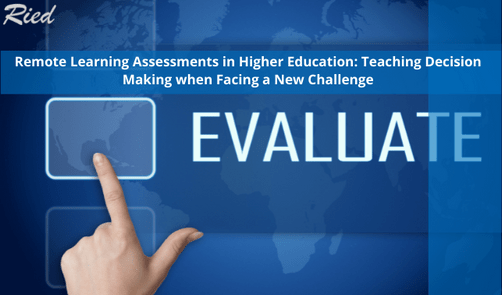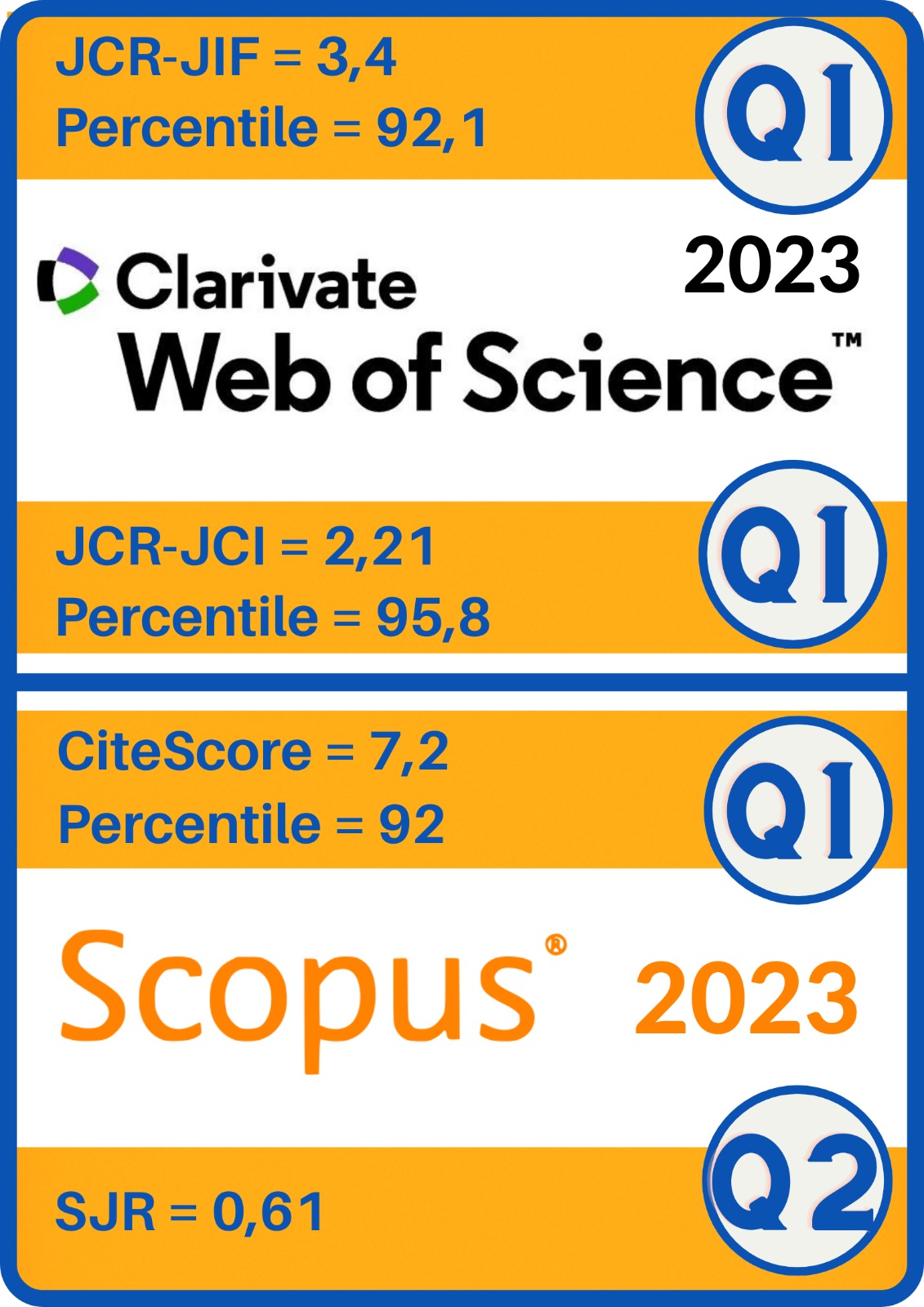Evaluación remota de aprendizajes en la Universidad: decisiones docentes para encarar un nuevo desafío
DOI:
https://doi.org/10.5944/ried.24.2.29078Palabras clave:
formación de profesores, práctica pedagógica, didáctica, tecnología de la educación, salud, COVID-19Resumen
La pandemia por COVID-19 y la suspensión de actividades presenciales enfrentó a las universidades con el desafío de remotizar sus funciones. Este trabajo se propone caracterizar propuestas de evaluación de aprendizajes diseñadas, al inicio del confinamiento, por docentes de grado y posgrado de ciencias de la salud en el contexto de una propuesta de Formación para la Virtualización de la Enseñanza (FVE) de un Instituto Universitario. Este estudio descriptivo-interpretativo analiza, desde un enfoque cualitativo, 51 planificaciones docentes de evaluación remota elaboradas en el contexto de la formación ofrecida. Las mismas se organizaron en una matriz documental para su categorización e identificación de rasgos prevalentes en estos diseños didácticos con el fin de construir hipótesis interpretativas.
Se evidencian propuestas diversas que mayormente evalúan los aprendizajes con intención de acreditar saberes. Prevalecen diseños de evaluación individual con un uso activo del conocimiento ligado a prácticas académicas y profesionales. Un gran porcentaje prevé su desarrollo en forma asincrónica, mediados por la escritura y con el uso de un amplio repertorio de herramientas digitales. Estas propuestas jerarquizan el andamiaje docente a estudiantes durante el proceso de evaluación. Finalmente, se sistematizan los campos emergentes que estructuraron el diseño de las propuestas de evaluación remota de los aprendizajes. Se genera así un insumo para pensar las prácticas evaluativas en el contexto de remotización de la enseñanza. Esperamos que esta contribución trascienda el escenario actual para identificar potencialidades ante la construcción de propuestas híbridas en la post pandemia y en otras disciplinas universitarias.
ARTÍCULO COMPLETO:
https://revistas.uned.es/index.php/ried/article/view/29078/23176
Descargas
Citas
Abella García, V., Grande de Prado, M., García-Peñalvo, F. J., y Corell Almuzara, A. (2020). Guía de recomendaciones para la evaluación online en las Universidades Públicas de Castilla y León (Versión 1.1). Zenodo. http://doi.org/10.5281/zenodo.3780661
Alruwais, N., Wills, G., y Wald, M. (2018). Advantages and challenges of using e-assessment. International Journal of Information and Education Technology, 8(1), 34-37. https://doi.org/10.18178/ijiet.2018.8.1.1008
Barberá, E. (2006). Aportaciones de la tecnología a la e-Evaluación. RED. Revista de Educación a Distancia, 5(6), 1-13. https://epk.is/11WZq
Bryan, C., y Clegg, K. (Eds.). (2019). Innovative assessment in higher education: A handbook for academic practitioners. Routledge. https://doi.org/10.4324/9780429506857
Camilloni, A., Celman, S., Litwin, E., y Palou de Maté, M. D. C. (1998). La evaluación de los aprendizajes en el debate didáctico contemporáneo. Paidós.
Carlino, P., Iglesia P., Bottinelli, L., Cartolari, M., Laxalt, I. y Marucco, M. (2013). Leer y escribir para aprender en las diversas carreras y asignaturas de los IFD que forman a profesores de enseñanza media: concepciones y prácticas declaradas de los formadores de docentes. Buenos Aires: Ministerio de Educación de la Nación. https://www.aacademica.org/paula.carlino/141
Castro, E. P. (2010). Evaluación de los aprendizajes y estudio de la interactividad en entornos en línea: un modelo para la investigación. RIED. Revista Iberoamericana de Educación a Distancia, 13(1), 17-38. https://doi.org/10.5944/ried.1.13.886
Condori Gutiérrez, J. (2020). La evaluación de las competencias en un modelo educativo emergente. Aportes desde el enfoque socioformativo. En J. Luna-Nemecio (Coord.), Memorias del Quinto Congreso Internacional de Evaluación Socioformativa (VALORA-2020). Congreso conducido por el Centro Universitario CIFE de Cuernavaca, México. https://cife.edu.mx/recursos
Contreras Domingo, J. (1990). Enseñanza, curriculum y profesorado. Introducción crítica a la didáctica. Akal.
Di Cerbo, K. (2020). Assessment for Learning with Diverse Learners in a Digital World. Educational Measurement: Issues and Practice, 39, 90-93. https://doi.org/10.1111/emip.12374
Dorrego, E. (2016). Educación a Distancia y Evaluación del Aprendizaje. RED. Revista de Educación a Distancia. 50(12). https://doi.org/10.6018/red/50/12
D'Souza, K. A., y Siegfeldt, D. V. (2017). A conceptual framework for detecting cheating in online and take‐home exams. Decision Sciences Journal of Innovative Education, 15(4), 370-391. https://doi.org/10.1111/dsji.12140
Er, H., Nadarajah, V., Wong, P., Mitra, N. (2020). Practical Considerations for Online Open Book Examinations in Remote Settings. MedEdPublish, 9(1),153. https://doi.org/10.15694/mep.2020.000153.1
Fardoun, H., González, C., Collazos, C., y Yousef, M. (2020). Estudio exploratorio en Iberoamérica sobre procesos de enseñanza-aprendizaje y propuesta de evaluación en tiempos de pandemia. Education in the Knowledge Society. https://epk.is/i5VIk
Fenstermacher, G. (1989). Tres aspectos de la filosofía de la investigación sobre la enseñanza. En M. Wittrock (Comp.), La investigación en la enseñanza Tomo 1. Paidós, M.E.C.
García-Peñalvo, F. J. (2020). Evaluación online: la tormenta perfecta. Ensinar A Distância. https://repositorio.grial.eu/bitstream/grial/2007/1/Tormenta.pdf
González-González, C., Infante Moro, A., e Infante Moro, J. C. (2020). Implementation of E-proctoring in Online Teaching: A Study About Motivational Factors. Sustainability. 1, 1-13. https://doi.org/10.3390/su12083488
Harper, R., Bretag, T., Rundle, K. (2020). Detecting contract cheating: examining the role of assessment type. Higher Education Research & Development, 39, 1-16. https://doi.org/10.1080/07294360.2020.1724899
Hodges, C., Moore, S., Lockee, B., Trust, T., y Bond, A. (2020). The difference between emergency remote teaching and online learning. Educause Review, 27. https://er.educause.edu/articles/2020/3/the-difference-between-emergency-remote-teaching-and-online-learning
Hoffmann, J. (2010). Evaluación mediadora. Una propuesta fundamentada. En R. Anijovich (Comp.), La Evaluación significativa, 73-102.
Maggio, M. (2012) Enriquecer la Enseñanza. Los ambientes con alta disposición tecnológica como oportunidad. Paidós.
Milillo, C., Odetti, V., Rogovsky, C., y Trech, M. (2019). Formatos innovadores para propuestas de educación en línea. En G. I. El Jaber, (Comp.), Actas de IV Jornadas Educación a distancia y Universidad, Ciudad Autónoma de Buenos Aires: Flacso Argentina, 2020. http://www.pent.org.ar/institucional/publicaciones/formatos-innovadores-para-propuestas-educacion-linea
Odetti, V., Schwartzman, G., y Bosch, M. E. (2020). Formatos innovadores para propuestas de educación en línea: una experiencia transmedia y gamificada. Boletín SIED, 1(1), 66-72. https://revista.sied.mdp.edu.ar/index.php/boletin/article/view/25
ParkJiao, H., y Lissitz, R. W. (2020). What Hath the Coronavirus Brought to Assessment? Unprecedented Challenges in Educational Assessment in 2020 and Years to Come. Educational Measurement: Issues and Practice, 39, 45-48. https://doi.org/10.1111/emip.12363
Perkins, D. (2010). El aprendizaje pleno. Principios de la enseñanza para transformar la educación. Paidós.
Pozo, J. I., y Pérez Echeverría, M. P. (2009). Psicología del aprendizaje universitario: La formación en competencias. Morata.
Quesada Castillo, R. (2006). Evaluación del aprendizaje en la educación a distancia “en línea”. RED. Revista de Educación a Distancia, M6 (Número especial dedicado a la evaluación en entornos virtuales de aprendizaje). http://www.um.es/ead/red/M6
Rapanta, C., Botturi, L., Goodyear, P., Guàrdia, L., y Koole, M. (2020). Online university teaching during and after the Covid-19 crisis: Refocusing teacher presence and learning activity. Postdigital Science and Education, 1-23. https://doi.org/10.1007/s42438-020-00155-y
Rivera Mata, J. (2020). How to Teach Online? Recommendations for the assessment of online exams with University students in the USA in times of pandemic. IJERI: International Journal of Educational Research and Innovation, 15, 188-202. https://doi.org/10.46661/ijeri.5003
Rose, F. (2012). The art of immersion: how the digital generation is remaking. Hollywood, Madison Avenue, and the way we tell stories. W. W. Norton & Company Editor.
Schwartzman, G. (2020). Formación docente para "virtualizar de emergencia": aportes a la respuesta universitaria ante la pandemia COVID-19. Revista Hospital Italiano de Buenos Aires, 40(1), 49-51. https://epk.is/fq0Xd
Schwartzman, G., Roni, C., Sánchez, M., Delorenzi, E., y Eder, L. (2019). Perspectiva académica de la enseñanza del profesorado universitario: ¿sobre qué prácticas reflexionan los docentes a partir de su formación? Congreso Europeo de Scholarship of Teaching and Learning (EuroSoTL). https://epk.is/qVMb9
University of Twente (2020). Choosing remote assessment method & tool. TELT. Technology Enhanced Learning & Teaching. https://tinly.co/MtkHg
Villavicencio, M. (2018). Comunicación académica: prácticas de lectura y escritura en el aula. Don Bosco.

Descargas
Publicado
Cómo citar
Número
Sección
Licencia
Derechos de autor 2021 RIED. Revista Iberoamericana de Educación a Distancia

Esta obra está bajo una licencia internacional Creative Commons Atribución 4.0.
Las obras que se publican en esta revista están sujetos a los siguientes términos:
1. Los autores ceden de forma no exclusiva los derechos de explotación de los trabajos aceptados para su publicación en "RIED. Revista Iberoamericana de Educación a Distancia," y garantizan a la revista el derecho a ser la primera en publicar ese trabajo, igualmente, permiten a la revista distribuir obras publicadas bajo la licencia indicada en el punto 2.
2. Las obras se publican en la edición electrónica de la revista bajo una licencia Creative Commons Reconocimiento 4.0 Internacional (CC BY 4.0). Se permite copiar y redistribuir el material en cualquier medio o formato, adaptar, remezclar, transformar y crear a partir del material para cualquier finalidad, incluso comercial. Debe reconocer adecuadamente la autoría, proporcionar un enlace a la licencia e indicar si se han realizado cambios.
3. Condiciones de auto-archivo. Se permite e incentiva a los autores a difundir electrónicamente la versión OnlineFirst (versión evaluada y aceptada para su publicación) de su obra antes de su publicación definitiva, siempre con referencia a su publicación en RIED, ya que favorece su circulación y difusión antes y así propiciar un posible aumento de su citación y alcance entre la comunidad académica. Color RoMEO: verde.







